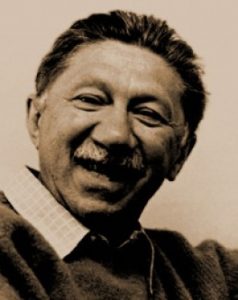11 Mar Abraham Harold Maslow (1908 – 1970)

Abraham Maslow – public domain (WikiMedia)
Nominated by Roger Cunningham:
Well, to begin, there are NO psychologists on the Hall of Fame! I suppose William James would be an appropriate add, being that he is considered the first American Psychologist.
However, I choose Abraham Maslow, as the founder of the Third Force in Psychology, the Humanist Movement and later Transpersonal Psychology. Maslow was born in Brooklyn, NY and taught at Brooklyn College before going to Brandeis.
Abraham Maslow developed the theory of human motivation now known as Maslow’s Hierarchy of Needs. A psychologist, Maslow noted that some human needs were more powerful than others. He divided those needs into five general categories, from most urgent to most advanced: physiological, safety, belonging/love, esteem, and self-actualization.
He later added to the top of the Heirarchy, Transpersonal, our relationship with our Higher Power. psychology that studies transcendent, or spiritual dimensions of humanity.
Transpersonal Psychology is interested to explore extreme wellness or optimal well-being. It is interested in those cases of persons who have often or perhaps permanently expanded their “normal sense of identity” to include the supra- or trans-personal, the Self of all selves, the One underlying the Many. Transpersonal Psychology explicitly acknowledges and makes use of the profound spiritual psychologies of the Great Traditions (Hinduism, Buddhism, Taoism, mystic Christianity, Judaism and Muslim Sufism). This allows us to include all cultures in our teaching of psychology and human services.
This was inclusive of Maslow first published his theory in the 1940s, and amended in the 1960s and it became a widely accepted notion in the fields of psychology and anthropology. Maslow was a professor at Brandeis University from 1951 until 1969; his major texts included Motivation and Personality (1954) and Toward a Psychology of Being (1962).







Recent Comments